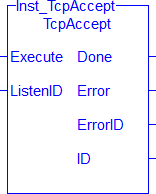TcpAccept
![]()
 Function Block - Performs the accept operation.
Function Block - Performs the accept operation.
Inputs
|
Input |
Data Type |
Range |
Unit |
Default |
Description |
|---|---|---|---|---|---|
|
Execute |
BOOL |
0 to 1 |
N/A |
No default |
On the rising edge, accept a new socket connection. |
|
ListenID |
UDINT |
N/A |
N/A |
No default |
The ID of a server socket returned by the TcpListen function block. |
Outputs
|
Output |
Data Type |
Range |
Unit |
Description |
|---|---|---|---|---|
|
Done |
BOOL |
|
|
If TRUE, the command completed successfully. |
|
Error |
BOOL |
|
|
If TRUE, an error has occurred. |
|
ErrorID |
DINT |
|
|
Indicates the error if Error output is TRUE. See the table in File and TCP/IP Function Block ErrorIDs. |
|
ID |
UDINT |
|
|
Either:
|
Remarks
-
- It is possible that the socket becomes invalid if an error occurs in the TCP connection after this function block is called.
Use the TcpIsValid function block after TcpSend.
If the socket is no longer valid, close it using the TcpClose function block.
- This function block performs the accept operation using default TCP settings.
- Use the TcpClose function block to release the socket returned by TcpAccept.

Figure 1: TcpAccept
FBD Language Example
Not available.
FFLD Language Example
Not available.
IL Language Example
Not available.
ST Language Example
(* TcpAccept example *)
CASE StepCounter OF
0:
Inst_TcpAccept(TRUE, MyListenID);
StepCounter := StepCounter + 1;
1:
Inst_TcpAccept(TRUE, MyListenID);
IF Inst_TcpAccept.Done THEN
MySocketID := Inst_TcpAccept.ID;
Inst_TcpAccept(FALSE, 0);
StepCounter := StepCounter + 1;
END_IF;
END_CASE;
See Also






